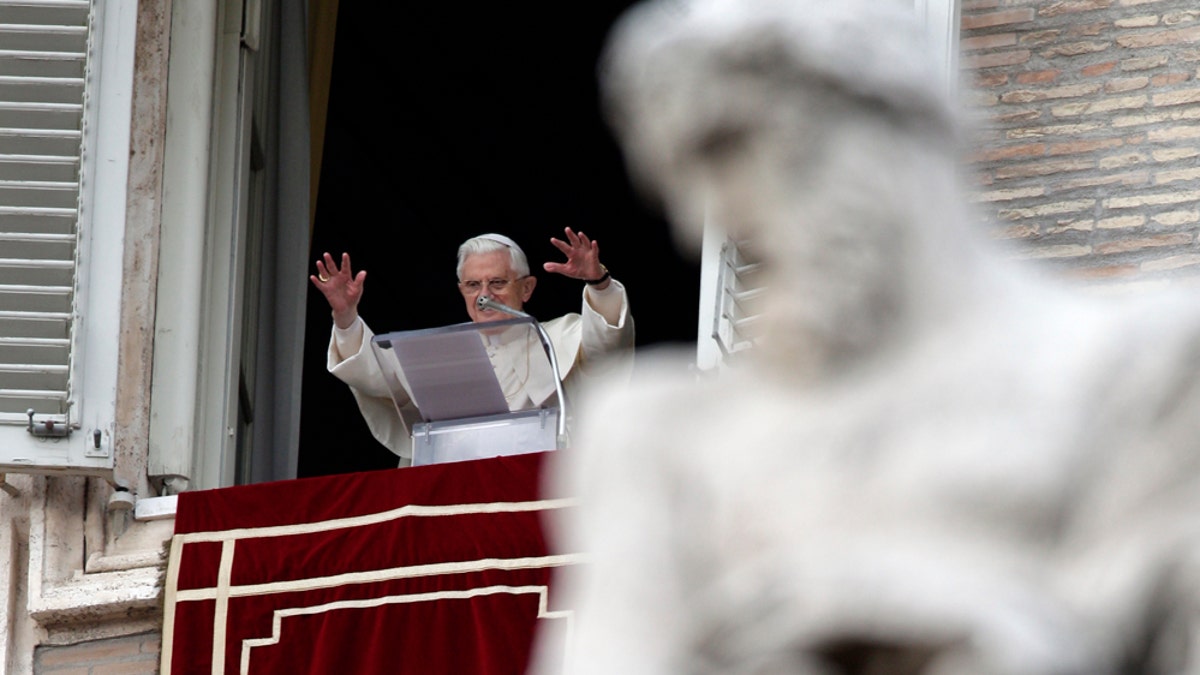
Pope Benedict XVI greets the faithful during the Angelus prayer from his studio window overlooking St. Peter's Square at the Vatican, Sunday, Jan. 23, 2011. (AP Photo/Pier Paolo Cito) (AP2011)
Pope Benedict XVI layed out a code of conduct of sorts for Catholic bloggers, facebook, and YouTube users Monday urging believers to be respectful of others when spreading the Gospel online.
The Catholic Church values quality over quantity as his holy see urged Catholics to not see their ultimate goal as getting as many online hits as possible.
In his annual message for the church's World Day of Social Communications, Benedict called for the faithful to adopt a "Christian style presence" online that is responsible, honest and discreet.
"We must be aware that the truth which we long to share does not derive its worth from its 'popularity' or from the amount of attention it receives," Benedict wrote. "The proclamation of the Gospel requires a communication which is at once respectful and sensitive."
Benedict didn't name names, but the head of the Vatican's social communications office, Archbishop Claudio Celli, said it wouldn't be incorrect to direct the pope's exhortation to some conservative Catholic blogs, YouTube channels and sites which, with some vehemence, criticize bishops, public officials and policies they consider not Catholic enough.
"The risk is there, there's no doubt," Celli said in response to a question. He noted that the Pontifical Council for Social Communications was working on a set of guidelines with recommendations for appropriate style and behavior for Catholics online.
"I don't love such things, but I think we can define some points of reference for behavior," he said.
In his message, Benedict echoed many of the same themes he has voiced in years past about the benefits and dangers of the digital age, saying social networks are a wonderful way to build relationships and community. But he warned against replacing real friendships with virtual ones and the temptation to create artificial public profiles rather than authentic ones.
"There exists a Christian way of communication which is honest and open, responsible and respectful of others," he wrote. "To proclaim the Gospel through the new media means not only to insert expressly religious content into different media platforms, but also to witness consistently, in one's own digital profile and in the way one communicates choices, preference and judgments that are fully consistent with the Gospel."
The 83-year-old Benedict is no techno wizard: He writes longhand and has admitted to a certain lack of Internet savvy within the Vatican.
But under Benedict, the Holy See has greatly increased its presence online: It has a dedicated YouTube channel, and its Pope2You.net portal gives news on the pontiff's trips and speeches and features I-Phone and Facebook applications that allow users to send postcards with photos of Benedict and excerpts from his messages to their friends.
Celli said the Holy See was working on a new multimedia portal that would be the point of reference for the whole Vatican that he hoped would be operational by Easter. It would start out in English and Italian, with other languages added later.
Currently, the Vatican website www.vatican.va has links to the Vatican newspaper, the Vatican Museums and other Vatican departments, but it's clunky and out of date.
Celli acknowledged that the pope's annual message -- which is full of technical jargon -- is not his alone. Celli's office prepares a draft and the pope then makes changes. Celli said he didn't know if Benedict had ever been on Facebook, but said he expected one of his aides had probably shown him around.
Based on reporting by the Associated Press.
Follow us on twitter.com/foxnewslatino
Like us at facebook.com/foxnewslatino
